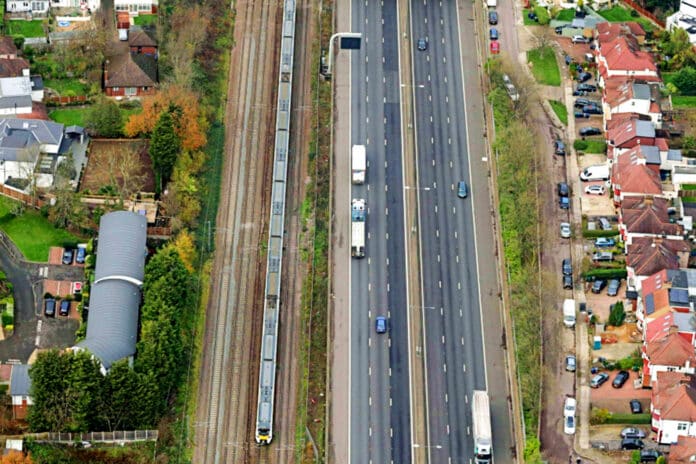Two-thirds of the British public recognise the railway as a greener mode of transport – and yet 73% of this group still primarily use cars to get around.
That was the key finding of a national survey carried out by Network Rail as part of the industry-wide ‘We Mean Green’ campaign to encourage travellers to make greener travel choices.
Two thousand people across the country were surveyed ahead of the UN Climate Change Conference (CoP26) in Glasgow asking them a range of questions about their travel habits.
It found that despite volatile fuel prices and rail’s significantly lower carbon emissions, people need further convincing to travel on trains rather than cars.
Using the train for leisure travel is on the rise, the study found.
Of the 2,000 people surveyed, 67% said they would consider using the train instead of a car for a day out with friends or family, and 55% would also consider using the train for travel to a big music or sports event.
The rise in leisure travel re-affirms the major impact Covid-19 has had on shifting passenger travel patterns with many still working from home.
Tim Shoveller, managing director for Network Rail’s North West & Central region, said: “Rail is the greenest form of public transport there is. We want to encourage as many people as possible to make the shift from car to train more regularly, particularly for long-distance travel – not just for the planet, but for reliability, comfort and safety.”
Incentives such as the introduction of flexible season tickets are helping to attract more people back to rail, with passenger numbers increasing by 19% in just the last two months.
Total passenger numbers are now at around 65% of pre-Covid-19 levels, with commuters steadily returning.
Currently 42% of the UK rail network is electrified, although 70% of trains run on these electrified routes*.
Network Rail has committed to reduce its own operational carbon emissions by 25% by 2024 as part of its pledge to become Net Zero by 2050 in line with government policy.
It is also the first railway firm in the world to set the most ambitious level of science-based targets for reducing carbon emissions to limit global warming to 1.5 degrees.
Another commitment is to do more to protect and conserve wildlife habitats on its land.
To read more about the rail industry’s We Mean Green campaign visit: www.networkrail.co.uk/stories/we-mean-green/
For further information about Network Rail’s sustainability commitments visit: www.networkrail.co.uk/sustainability/.
*Benefits of electrification
- It’s significantly better for the environment – electric trains emit 60% less carbon than diesel trains, potentially rising to 80% by 2040
- Electric routes produce less air pollution than diesel alternatives
- Electric trains are quieter, reducing noise and vibration for passengers and those living and working near the tracks
- In the long term, electric trains cost less when compared to the whole-life costs of diesel engines
- Electrification can reduce journey times due to better acceleration which contributes towards a railway that is not only greener, but faster too
- Electric trains are simpler, more reliable and easier to maintain than diesel trains, meaning fewer delays
Photo credit: Network Rail Air Operations







































 0113 2082620
0113 2082620 info@railbusinessdaily.com
info@railbusinessdaily.com 15 Mariner Court, Wakefield WF4 3FL
15 Mariner Court, Wakefield WF4 3FL

